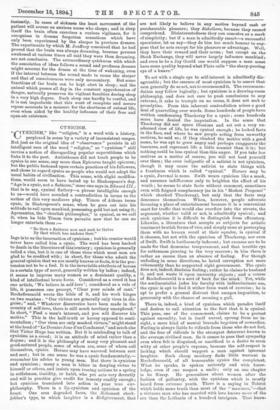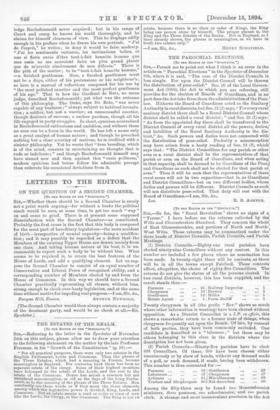CYNICISM.
"CYNICISM," like "religion," is a word with a history, perplexed in sense by a variety of inconsistent usages. But just as the original idea of " observance " persists in all intelligent uses of the word "religion," so " cynicism " still carries a notion of disregarding popular superstitions which links it to the past. Antisthenes did not teach people to be cynics in our sense, any more than Epicurus taught epicures; but the public fastened upon certain practices of his followers, and chose to regard cynics as people who would not adopt the usual habits of civilisation. This sense, with slight modific,a- Eons, would seem to have lasted up to Shakespeare's day. "Age is a cynic, not a flatterer," some one says in Edward III ,•
. that is to say, cynical flattery—a phrase intelligible enough to us—would have sounded a contradiction in terms to the author of this very mediocre play. Timon of Athens tarns cynic, in Shakespeare's sense, when he goes out into his solitude to rail upon mankind, possessing gold but not using it; Apemantus, the "churlish philosopher," is cynical, as we call it, when he bids Timon turn parasite now that he can no longer entertain them :— "Be thou a flatterer now and seek to thrive By that which has undone thee."
Iago is to us the incarnation of cynicism; but his creator would never have called him a cynic. The word has been hacked to death in the literature of this:century ; cynicism is generally called a vice, but it is one of those vices which most men are glad to be credited with ; in short, for those who admit the general opinion that we are mostly knaves or fools, it is the pre- tension not to be a fool. It is the invariable attribute of heroes in a certain type of novel, generally written by ladies ; indeed, it seems to impress many women as a dominant quality, a kind of intellectual brute force. Considered as a creed it has one article, We believe in sell-love'; considered as a rule of life, it possesses one precept, "Clear your minds of cant." Rochefoucauld wrote the bible of it, and his work hinges on two maxims : "Our virtues are generally only vices in dis- guise;" and, "Whatever discoveries have been made in the country of self-love, there is still much territory unexplored." In short, "Find a man's interest, and you will discover his motive." This is the half-truth or heresy opposed to senti- mentalism; "Our vices are only masked virtues," might stand at the head of "Le D ernier Jour d'un Condanane," and much else that Victor Hugo has written. But it is misleading to talk of cynicism as a creed; it is an attitude of mind rather than a dogma; and it is the philosophy of many very pleasant and good-natured people, some of whom are, some of whom call themselves, cynics. Horace may have wavered between sect and sect ; but in one sense he was a cynic fundamentally,— remember his advice to young men. Bat there is cynicism and cynicism ; many a man is bitter in denying virtue to himself or others, and insists upon tracing actions to a spring in selfishness, timidity, or habit, who yet acts very decently and will in practice give credit for honesty readily enough ; but cynicism translated into action is your true cur- philosophy. There is a lip-cynicism and cynicism of the heart. One Flees degraded faces, the dishonest stock- jobber's type, to which laughter is a disfigurement, that are not likely to believe in any motive beyond cash or purchaseable pleasure ; they disbelieve, because they cannot comprehend. Disinterestedness they can conceive as a mark of simplicity; but if a an is admittedly smart—a successful speculator, let us say—they do him too much honour to sup- pose that he acts except for his pleasure or advantage. Well, they have their reward and their arena ; but except on the Stock Exchange, they will never largely influence mankind; and even to be a Jay Gould one would suppose a man must have some quality beyond what Plato calls "the sharp-peering eye of a knave."
To act with a single eye to self-interest is admittedly dis- agreeable ; but the essence of most cynicism is to assert that men generally do so act, not to recommend it. The recommen- dation may follow logically ; but cynicism is a drawing-room philosophy, and does not care to push conclusions to any extreme, it asks to trample on no corns, it does not seek to proselytise. From this inherent contradiction arises a good deal of quarrelling over words. Some hundreds of people have written condemning Thackeray for a cynic ; some hundreds more have denied the imputation. In the sense that Thackeray did not spare illusions and set out a very un- adorned view of life, he was cynical enough ; he looked facts in the face, and where he saw people acting from unworthy motives, he said so ; if they cloaked the motive with a good name, he was apt to grow angry and perhaps exaggerate the baseness, and represent life a little seamier than it is ; but nothing could be less cynical than this anger. If you take low motives as a matter of course, you will not heat yourself over them ; the swva indigriatio of a satirist is not cynicism. though it may cause the satirist to state things with a frankness which is called "cynical." Horace may be a cynic, Javenal is none. Swift wears cynicism like a mask, and assumes indifference only to heighten the effect of his wrath ; he seems to state facts without comment, sometimes even with feigned complacency (as in his "Modest Proposal" which shocked Thackeray), but only that the facts may denounce themselves. When, however, people advocate licensing a place of entertainment because it is a convenient mart for traffic that would else overflow into the streets, the argument, whether valid or not, is admittedly cynical; and such cyniciem it is difficult to distinguish from effrontery. Likewise, a literature that accepts as subjects for artistic treatment brutish forms of vice, and simply aims at portraying them with no human recoil at their squalor, is cynical if it chooses, but not with the cynicism of Thackeray, nor even of Swift. Swift is loathsomely indecent ; but excuses are to be made for that demoniac temperament, and that terrible eye for rottenness piercing to the very marrow ; in him there is rather an excess than an absence of feeling. For though unfeeling in some directions, he hated corruption not more vehemently than he supported right government. The cynic does not, indeed, disclaim feeling; rather he claims to husband it, and not waste it upon unworthy objects ; and a course of Rochefoucauld is a sort of back for the mind. Yet, while the sentimentalist jades his faculty with indiscriminate use, the cynic is apt to find it wither from want of exercise ; he is apt to prefer a general distrust that escapes imposition, to generosity with the chance of seeming a gull.
There is, indeed, a kind of cynicism which parades itself and desires to call attention to the fact that it is cynical. This pose, one of the commonest, claims to be a protest against unreality, bat is itself unreal, sprung from no in. sight, a mere kind of mental bravado begotten of cowardice. Feeling is always liable to ridicule from those who do not feel, and the fear of ridicule is the strongest deterrent known to the average civilised man. So it comes to pass that sympathy even when felt is disguised, or sacrificed to a desire to seem witty at other people's expense, because the self-respect is lacking which should support a man against ignorant laughter. Such cheap mockery finds little warrant in Rochefouca.uld, of all honourable cynics the completest. What he speaks, is spoken seriously and with know- ledge, even if one suspect a smile ; only on one chapter is he flimsy. He generalises about women after the fashion of gallantry, with the cynicism which is mostly beard from extreme youth. There is a saying in Tolstoi which holds more truth than most of the " max imes,"—that a virtuous man who has married with love knows more of the sex than the Lothario of a hundred intrigues. Tbat know- ledge Roohefoucauld never acquired; but in his range of Court and camp he knows his world thoroughly, and he claims for himself clearness of view. This he displays oddly enough in his preface when he draws his own portrait. " J'ai de l'esprit," he writes ; to deny it would be false modesty. " J'ai lea sentiments vertueux, les inclinations belles, et une si forte envie d'être tout.-fait honnete homme que mes amis no me sauroient faire un plus grand plaisir quo de m'avertir sincerement de mes defauts." There is the pith of the matter ; to be "tout.-fait honnete homme," —a finished gentleman. Now, a finished gentleman must not be a dupe, either of his pretensions or his neighbour's ; so here is a manual of reflections composed for his use by "the most polished courtier and the most perfect gentleman of his age." That is how the Cardinal de Retz, no mean judge, described Rochefoucauld ; yet what was the outcome of this philosophy. The Duke, says De Retz, "was never capable of any business ; " always subject to habitual irresolu- tion; a soldier, but not a warrior; an unsuccessful courtier, though desirous of success; a useless partisan, though all his life engaged in party struggles. In short, cynicism neutralised in Rochefoucauld enthusiasm and ambition, and without these no man can be a force in the world. He has left a name only as a great analyst of human nature ; and though he preached nothing but a close scrutiny of motives, he is credited with a sinister philosophy. Yet he wrote that "true breeding, which is of the mind, consists in entertaining no thought that is rude or indelicate ; " and though Rochefoucauld himself may have sinned now and then against this " vraie politesse," modern cynicism had better follow his admirable precept than reiterate his occasional deviations from it.









































 Previous page
Previous page